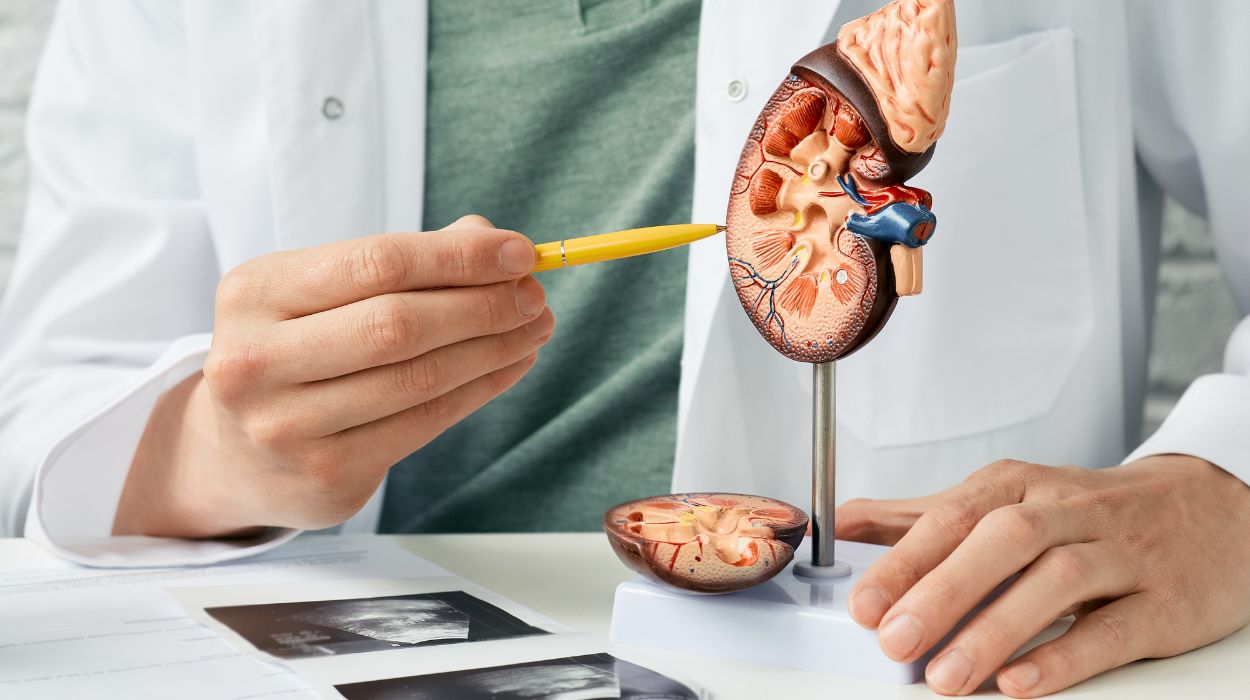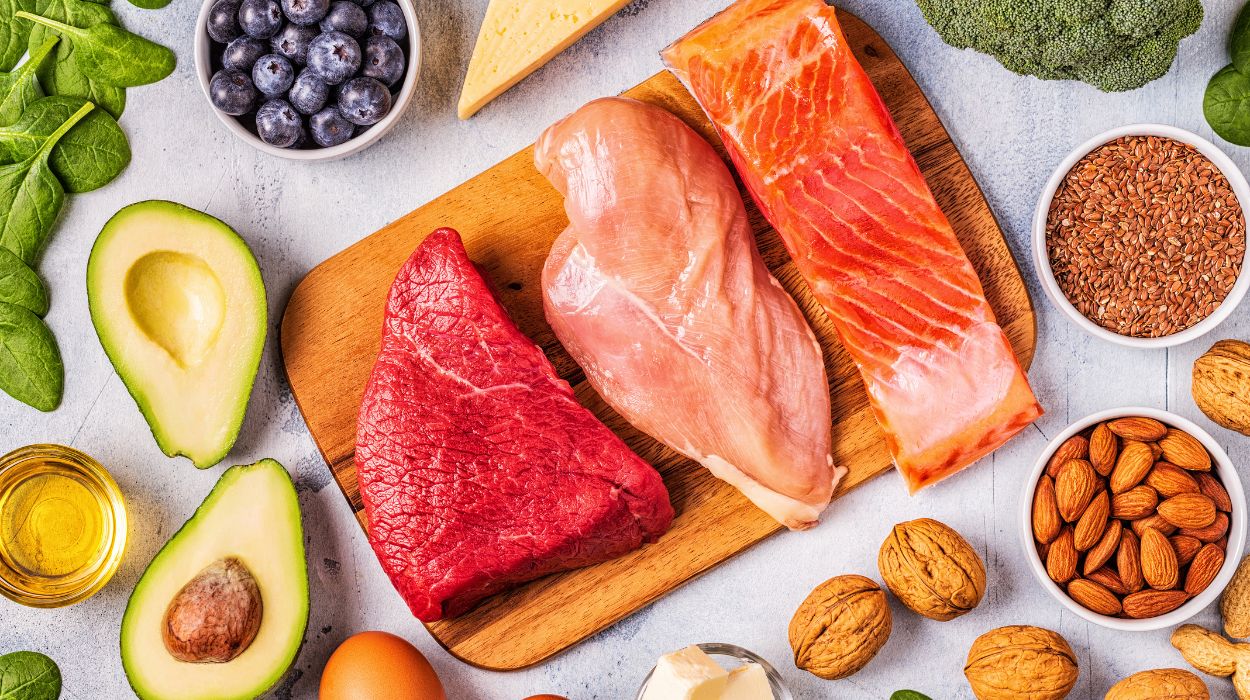 Expert's opinion
Expert's opinion
Expert's opinion
The article is a subjective view on this topic written by writers specializing in medical writing.
It may reflect on a personal journey surrounding struggles with an illness or medical condition, involve product comparisons, diet considerations, or other health-related opinions.
Although the view is entirely that of the writer, it is based on academic experiences and scientific research they have conducted; it is fact-checked by a team of degreed medical experts, and validated by sources attached to the article.
The numbers in parenthesis (1,2,3) will take you to clickable links to related scientific papers.
Is Keto Bad For Kidneys? 6 Keto Side Effects On Kidneys 2024

The ketogenic diet, or keto for short, is a high-fat, low-carb, high-protein diet aimed to “starve” the body of carbs, which pushes the body into ketosis, the state of burning fat for energy, rather than carbs. While this eating approach has many health benefits, it could be potentially harmful to the kidneys, especially for individuals with already-weakened kidneys, including those with chronic kidney disease. This article will cover some of the side effects of the keto diet on kidney health. For those looking for ways to protect their kidneys, you may be interested in what foods help repair kidneys, how to get rid of kidney stones, as well as the best low sodium protein powder and Nested Natural Super Greens.
Is Keto Bad For Kidneys? Keto Side Effects
Some complications associated with the ketogenic diet include:
- More strain on troubled kidneys
- Metabolic acidosis
- Dehydration and electrolyte imbalance
- Higher risk for kidney stones
- Stress to kidneys
- Complications for diabetes
6 Keto Diet Side Effects On Kidney

More Strain To Troubled Kidneys
The nature of the ketogenic low carbohydrate diet can be strenuous for even healthy kidneys. However, when already-strained kidneys have to process dietary protein from animal products, it is significantly more dangerous; the kidneys have to work extra hard to metabolize the protein and excrete waste through urine, impeding kidney function.
Metabolic Acidosis
Metabolic acidosis[1] can happen with kidney disease or kidney failure when the body builds up too much acid. In other words, the body is unable to rid itself of enough acid, which throws the body off balance. Keto has the potential to increase acid in the body, which can worsen this condition. Aside from this, keto can negatively impact glucose tolerance and metabolism.[2]
Dehydration And Electrolyte Imbalance
During ketosis, when the body is burning fat for energy, ketones are produced, which can cause the body to lose more water. With more water loss comes dehydration, unless fluids are being replaced quickly. Also, electrolytes need to be in balance for kidneys to function well (especially sodium, potassium, and magnesium) and kidney function relies heavily on electrolyte balance. The keto diet can cause imbalances and loss in electrolytes which can lead to kidney stones, low blood pressure, or other impairments to kidney function.
Higher Risk For Kidney Stones
Kidney stones[3] are one unpleasant possible side effect of the ketogenic diet. While in ketosis, uric acid increases, which can lead to the formation of stones in the kidneys. Excess calcium can also lead to the buildup of stones. As mentioned, the electrolyte imbalance that can occur during ketosis is another possible pathway that leads to kidney stones.
Stress To Kidneys
Even with perfectly functioning kidneys, without any history of kidney disease or diabetes, it is important to know that a ketogenic diet does put the kidneys to work. The kidneys work for us all the time to remove waste and keep our body in balance, but they go under additional strain when the body is in ketosis. This may not pose much risk of consequences for healthy individuals, however, it’s something to be aware of if you decide to try keto.
Complications For Diabetes
Patients who have diabetes need to be mindful of their carb intake. On the one hand, having too much can spike blood sugar, but on the other hand, not having enough (or enough of the right type of carbs) can cause hypoglycemia,[4] and dangerously low drops in blood sugar. With the keto diet limiting carbohydrates, it can pose additional complications for some people with diabetes. This would need to be monitored on a case-by-case basis.
How Do Your Kidneys Work?
Everyone has two kidneys,[5] yet not everyone is aware of their role in the body. The kidneys are aptly shaped like kidney beans, each one sitting just below the rib cage on both the left and right sides of the body. The kidneys work by filtering blood (about half a cup a minute), extracting waste and water, then creating urine from it. From there, urine is sent to the bladder to be stored (and excreted later).
In addition to excess fluid and waste, the kidneys help to remove acid created from our cells. This allows the body to keep a healthy balance of water, salt, and minerals in the blood. This keeps us properly hydrated and our pH levels in balance. Our kidneys also release hormones that control our blood pressure, help produce red blood cells, and ensure our bones stay strong.
Is Keto Bad For Your Kidneys?

To say that the ketogenic diet is harmful to kidneys is too broad a claim. For those with healthy functioning kidneys, keto may be a healthful eating approach (and for some, it may be necessary). However, the medical community generally agrees that people who have chronic kidney disease (CKD), or any reduced kidney function (whether from an infection, diabetes, or hypertension), may be further harming their kidneys by eating a keto diet. This, in part, is due to the high protein intake and high fat in the diet (especially from animal products). If the overall goal for patients is to lose weight, there are other ways to achieve it. For example, it’s generally safer to encourage a diet high in whole foods, such as fruits and vegetables, whole grains, and legumes. This can lead to better long-term weight loss outcomes while sparing the kidneys from further strain.
What Happens To My Kidneys When I’m In Ketosis?
Ketosis is a metabolic state in which there are elevated ketone levels in the body. This metabolic state is common among people with diabetes,[6] as well as for people who are on a ketogenic diet, in which they’re intentionally reducing their carbohydrate intake. When carb intake is minimized, the body “runs low on” carbs to burn, and instead, burns fat. It is this process which produces more ketones in our bodies. Without carbs, insulin secretion decreases dramatically, as well. Once in this state of ketosis, especially if there are large amounts of animal protein consumed, the uric acid in urine can increase, potentially leading to the formation of kidney stones.
Keto Kidney Stones: Can Keto Cause Them?
Yes, a ketogenic diet can lead to kidney stones, though it is not a guarantee. Uric acid[7] levels increase during ketosis, and this can lead to uric acid stones (a type of kidney stone). Additionally, people on keto could develop calcium-based stones in their kidneys. It’s a risk everyone should be aware of before starting keto.
Should Those Who Are At Kidney Disease Risk Try Keto?
Due to the many kidney-related complications associated with keto, it’s best for those who are at increased risk for developing kidney disease to avoid keto. If there is a particular reason why an individual who is at risk for kidney disease should want to try keto, it’s best to discuss it with their doctor and come up with a plan to achieve the desired results with less risk.
Conclusion
The ketogenic diet, one of the low-carb diets, can be effective for many people for weight loss and managing certain medical conditions, however, it may not be suitable for everyone, especially those with kidney issues. The nature of keto requires a taxing effort for the kidneys, making it unsuitable, if not dangerous, for anyone with already weakened kidneys (such as those with CKD). From dehydration to kidney stones to hypoglycemia, keto can pose more harm than benefit for these individuals. Always consult with your doctor if you would like to explore the ketogenic diet to ensure it’s right for your body.
+ 7 sources
Health Canal avoids using tertiary references. We have strict sourcing guidelines and rely on peer-reviewed studies, academic researches from medical associations and institutions. To ensure the accuracy of articles in Health Canal, you can read more about the editorial process here
- Kraut, J.A. and Madias, N.E. (2010). Metabolic acidosis: pathophysiology, diagnosis and management. Nature Reviews Nephrology, [online] 6(5), pp.274–285. doi:https://doi.org/10.1038/nrneph.2010.33.
- Jia, P., Huang, B., You, Y., Su, H. and Gao, L. (2021). Ketogenic diet aggravates kidney dysfunction by exacerbating metabolic disorders and inhibiting autophagy in spontaneously hypertensive rats. Biochemical and Biophysical Research Communications, [online] 573, pp.13–18. doi:https://doi.org/10.1016/j.bbrc.2021.08.003.
- Acharya, P., Acharya, C., Charat Thongprayoon, Panupong Hansrivijit, Kanduri, S.R., Karthik Kovvuru, Medaura, J., Pradeep Vaitla, Garcia, D.F., Poemlarp Mekraksakit, Pattharawin Pattharanitima, Tarun Bathini and Wisit Cheungpasitporn (2021). Incidence and Characteristics of Kidney Stones in Patients on Ketogenic Diet: A Systematic Review and Meta-Analysis. Diseases, [online] 9(2), pp.39–39. doi:https://doi.org/10.3390/diseases9020039.
- Spoke, C. and Samar Malaeb (2020). A Case of Hypoglycemia Associated With the Ketogenic Diet and Alcohol Use. Journal of the Endocrine Society, [online] 4(6). doi:https://doi.org/10.1210/jendso/bvaa045.
- and, D. (2023). Your Kidneys & How They Work. [online] National Institute of Diabetes and Digestive and Kidney Diseases. Available at: https://www.niddk.nih.gov/health-information/kidney-disease/kidneys-how-they-work
- Mollah, T., Gillespie, C., Cocco, A., Taylor, L., Chong, L. and Hii, M.W. (2023). Defining Physiological Ketosis Following Very-Low-Calorie Diets. Journal of Surgical Research, [online] 290, pp.197–202. doi:https://doi.org/10.1016/j.jss.2023.05.001.
- Acharya, P., Acharya, C., Charat Thongprayoon, Panupong Hansrivijit, Kanduri, S.R., Karthik Kovvuru, Medaura, J., Pradeep Vaitla, Garcia, D.F., Poemlarp Mekraksakit, Pattharawin Pattharanitima, Tarun Bathini and Wisit Cheungpasitporn (2021). Incidence and Characteristics of Kidney Stones in Patients on Ketogenic Diet: A Systematic Review and Meta-Analysis. Diseases, [online] 9(2), pp.39–39. doi:https://doi.org/10.3390/diseases9020039.



